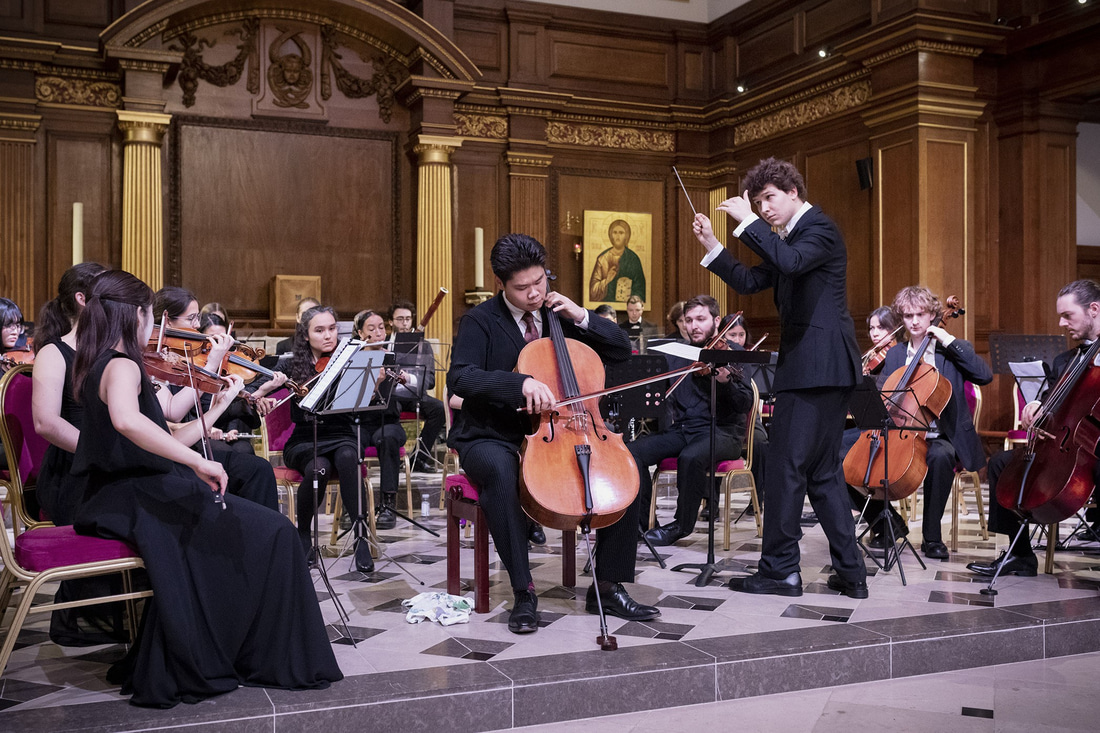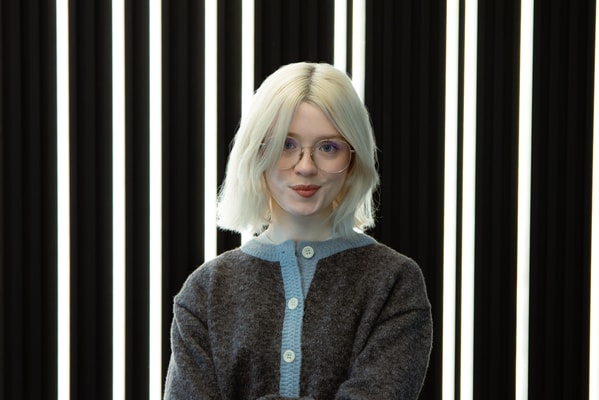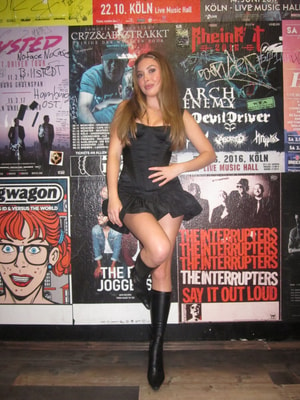Romantic Origins: A Captivating Evening With The Willow Orchestra, Featuring William Lui

On 14 November, the Willow Orchestra performed a stunning three-part performance in the Church of St Andrew, Holborn.
With its high ceilings and white arches detailed in gold, the venue gave a resonant setting well-suited to the evening’s theme of ‘Romantic Origins’.
The concert opened with Camille Saint-Saëns’ Cello Concerto No. 1, known for its virtuosic passages and powerful contrasts.
All eyes were on soloist William Lui, who was centre stage on the cello. Lui gave a strong performance from the start, launching into the opening of Saint-Saëns’ piece with a clear, assertive energy.
The cellist boasts an impressive performance history, spanning a career that includes appearances in Vienna, Shanghai, and several British festivals. And it shows in Lui’s unwavering performance, which provided a continual steadiness that anchored the ensemble.
Surprisingly, Saint-Saëns broke concerto tradition with Cello Concerto No. 1, and unlike a standard three-movement concerto, this work is written as a single, continuous movement. This means performers had the additional challenge of navigating changes from energetic virtuosity to calmer melodies without making the piece feel disjointed.
As the concerto shifted into its quieter passages, Lui leaned into a more emotional side of the performance, taking the show without being overbearing.
The dramatic contrasts of intensity against repose steadily urged the piece toward a powerful finish.
Gabriel Fauré’s Élégie followed at a melancholic, gentle pace, adding a more introspective feel to the concert. The exchange between the soloist and the ensemble was more seamless than the previous piece and beautifully woven together.
The middle of Élégie built to a short, intense climax, with sharp notes from the violins breaking the audience out of their reverie.
Throughout, conductor Bogdan Skrypka maintained a calm and assured presence. Skrypka founded the Willow Orchestra in 2023, and a natural confidence was evident in his fluid and precise gestures, giving the ensemble a unified momentum.
The piece gradually resolved in a tender, reflective ending, with some final poignant notes from Lui.
After the interval came the night’s longest piece, Jean Sibelius’ Symphony No. 2. This work is one of the composer’s most beloved symphonies and one of the defining examples of his early national-romantic style.
Sibelius’ long crescendos and gradual shifts were handled cleanly by Skrypka, and without a soloist next to him, Skrypka’s conducting took on a greater focus. His gestures were larger and more expressive, both guiding and responding to the ensemble effortlessly.
The pizzicato basses, particularly in the second movement, provided a restless undercurrent and gave the lower strings a memorable edge.
In the fourth and final movement, the symphony grew to an expansive, triumphant finish.
Sibelius himself described the symphony as a “confession of the soul.” And for a concert with the theme of ‘Romantic Origins’, the Willow Orchestra certainly did the piece justice.
However, the most touching moment of the night came after the concert. Skrypka was approached on stage by his grandmother, Martha Shevchenko, who had travelled from Ukraine to be there. The emotional embrace shared between them was incredibly moving. She had taught him music when he was young, and, in many ways, she is the reason he conducts at all.
It added a personal touch to the evening and left the audience with a deep sense of connection.
After the concert, I sat down with Bogdan Skrypka, the conductor and founder of Willow Orchestra.
Here's The Full Interview:
Nicole: Thank you for such a beautiful concert tonight, and what a touching moment at the end with your grandmother.
Bogdan: Thank you, and yes, it means a great deal that she came here tonight. When I transitioned from percussion to conducting, she introduced me to the basic technique, helping me to think critically and understand conducting in various musical contexts, including different styles, periods, and the differences between choral and orchestral conducting.
Nicole: It’s interesting that you started your musical journey as a percussionist. What was the moment that you realised you wanted to conduct instead of play?
Bogdan: I think the first time that I genuinely had this kind of fire within me to really want to get up there and conduct was during my time at the Guildhall, when I was playing in the symphony orchestra. And it's purely just from watching conductors up at the front, because percussionists have hundreds of bars at rest, and they're sitting there doing nothing in rehearsals and during a concert. And instead of me sitting there doing nothing, I really analysed what the conductor was doing.
I realised that the conductor is, in a way, the translator of what the composer has written in the end. Also, the composer cannot write on the page every single instruction and what they intend with the music, so you need to bring something out of it. I don't know if there's anything else in life like that, where you have to bring out something like this, but maybe a book. For example, in a novel, it's your imagination since you're the one reading it. So, when it comes to performance, you are telling the story to the audience.
Nicole: As a conductor, then, you have to balance not just your own performance, but the performance of other people. How do you create a space where everyone feels like they're playing a part?
Bogdan: I mean, the main thing I’d argue is transparency. I aim to be as transparent as possible with everyone about everything. Really, I always say to people, 'If you have any questions, thoughts, or advice, please come up to me.' Talk to me. It's only been two years now, and we're going to continue creating a nice, friendly space while also focusing on what the concert should feel like as a whole.
It's great, because all of the skills that I have from piano, percussion, and teaching all come into play. I know what it's like, based on the lessons I learned growing up. I know what I would have liked as a young student, the way teachers would have treated me. Basically, I know what my students want, which is a positive atmosphere when we work and during the concert.
Actually, quite a lot of conductors prefer to be a bit strict, maybe just a little tense in the room, and try to maintain themselves as this professional persona. I really don't like to think like that ever. I like to be myself, create a nice working environment so that no one's stressed in the room. Because if I'm stressed, then the music will be stressed.
Nicole: And do you think this is what makes you stand out from other conductors?
Bogdan: Yes, because I just put my whole body and soul into the concert, and we are all in the room, together, for this shared experience of music, both audience and orchestra. This means I always get incredibly emotional at the end of the concert.
Nicole: That’s really interesting. So, would you say you generally prefer conducting more lyrical pieces, like tonight?
Bogdan: If it's between more dramatic works or lyrical pieces, I prefer the lyrical, because that brings out my skills more. It shows what I'm really about as a musician and conductor. Because the dramatic works everyone knows. It's nice to do dramatic works once in a while, but in reality, the main works I like to conduct are romantic ones. So I'm a real, real fan of Rachmaninov and that kind of sound. But mostly, above all, it's the rhythmical stuff. So, composers like Stravinsky, I love that stuff, because that brings out the rhythmical side of my musicality. I also feel that my percussion side can help lean towards things that involve rhythm, tempo, and speed, bringing a bit of energy to the concert.
Nicole: Will you keep this focus on lyrical pieces in the future? Or do you have any new ideas in the making?
Bogdan: I persistently look forward to what's next. I'm always listening to different pieces and discovering new works. Always thinking about how we can create a real, refined concept that's different from what is usually done.
I prefer the romantic stuff, but that's not something that I want Willow to completely go into. If anything, what I want Willow to be is something very similar to what the Aurora Orchestra is doing. They are the one orchestra genuinely out of every orchestra that I can think of in the world that is doing things very differently and is paving the path ahead, because what they do is they perform pieces by heart. It’s phenomenal. And the reason being, I am a firm and true believer of that way of music making, because when it comes to solo performances on the piano or whichever instrument, musicians prefer to perform by heart. You get rid of that barrier, that physical barrier of sheet music in front, and you are free to make the music.
What the Aurora Orchestra does is fuse narration with movement and lighting. There are really interesting setups of the orchestra, and I've done that recently with our birdsong concert. We had the musicians positioned around the audience, which created a kind of surround sound, making the experience immersive. For 15 minutes straight, the audience was really listening to those sounds, rather than being bombarded with the cacophony of sound. And what I did is very similar to what Aurora did, and I'd love for Willow to carry on down that path.
Nicole: That sounds incredible. Could you share what upcoming plans or projects the orchestra has?
Bogdan: Yes! This will be St Barnabas' Organ Inauguration concert; the organ has been refurbished for the first time in 90 years, and we will be performing a programme to showcase the instrument's beauty. We will perform a selection of organ works by Messiaen, choral works, Poulenc's Concerto for Two Pianos, and Respighi's Church Windows.
Nicole: Thank you so much for taking the time to talk to us!
REVIEW BY

Nicole
I love writing about music venues where artists first started out and the rich histories behind them. London is full of iconic spots that musicians performed at earlier in their careers, which have inspired cover bands and lots of new artists hoping to follow in their footsteps.



